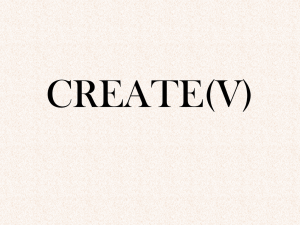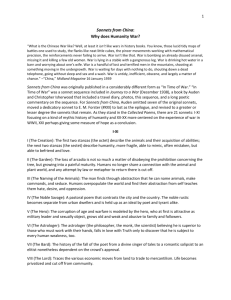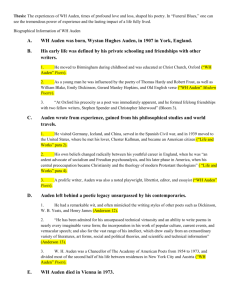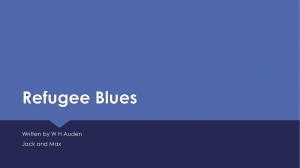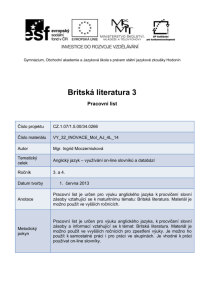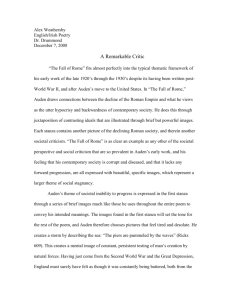W.H. Auden - BaserEnglishProgram
advertisement
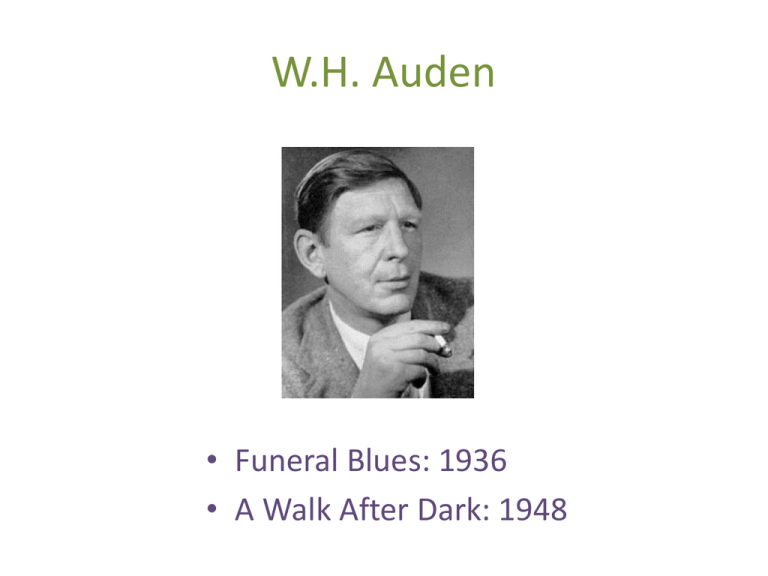
W.H. Auden • Funeral Blues: 1936 • A Walk After Dark: 1948 Biography of W.H. Auden W.H. Auden's full name is Wystan Hugh Auden. He was born on February 21, 1907 at York, England. He passed away on September 29, 1973. Auden is an author, playright, and a poet whose poetry was influenced by Thomas Hardy, Robert Frost, William Blake, Emily Dickinson, and Gerard Manley Hopkins. He has been admires for his unsurpassed virtuosity and ability to write poems in nearly every imaginable verse form ever since he published his collection Poems in 1928. Auden has visited Germany, Ireland, China, served in the Civil War, and in 1939 moved to the US where he became an American citizen. Hence, his poems frequently recounts, literally or metaphorically a journey or quest, and his travels provided rich material for his verse. A Walk After Dark A cloudless night like this Can set the spirit soaring: After a tiring day The clockwork spectacle is Impressive in a slightly boring Eighteenth-century way. Yet however much we may like The stoic manner in which The classical authors wrote, Only the young and rich Have the nerve or the figure to strike The lacrimae rerum note. It soothed adolescence a lot To meet so shameless a stare; The things I did could not Be so shocking as they said If that would still be there After the shocked were dead For the present stalks abroad Like the past and its wronged again Whimper and are ignored, And the truth cannot be hid; Somebody chose their pain, What needn't have happened did. Now, unready to die But already at the stage When one starts to resent the young, I am glad those points in the sky May also be counted among The creatures of middle-age. Occurring this very night By no established rule, Some event may already have hurled Its first little No at the right Of the laws we accept to school Our post-diluvian world: It's cozier thinking of night As more an Old People's Home Than a shed for a faultless machine, That the red pre-Cambrian light Is gone like Imperial Rome Or myself at seventeen. But the stars burn on overhead, Unconscious of final ends, As I walk home to bed, Asking what judgment waits My person, all my friends, And these United States. A Walk After Dark Analysis A Walk after dark is written just after the war unlike September 1, 1939, which is pre war. 1st stanza talks about the event of war from time to time(clockwork spectacle) that people can see if truths are all revealed(cloudless night).Even after a tiring day,a person\'s urge to change the world will set his/her spirit soaring, but they are still bound by customs and rules (18th century way). 2nd:Sometimes somebody will rise and potray his wishes towards the authority to stop the war, and the generations of people of nation will be soothed. But Auden could only shock the authority with what he did, and the authority will try their best to cover the \'rebellion\',unless they are dead. 3rd:Auden did so much in the politic world, and yet he can\'t save the nation after years of effort from young to old; but he is glad that atleast he is not the only one that is going to blame, there is those points in the sky (people of US: stars) that did nothing for the nation, that will be blamed by future generations too. 4th:It soothes Auden( the people of nation) better to think that they did not do any fault, and the wars initiated by the country is not of their fault, so that the next generation will take care of them, instead of keeping them aside, letting them to rot to death. Auden is aware that the hope for peace and unity is gone when the war initiated the first attack, and it will be lost forever, perhaps like his virginity (or myself at seventeen) 5th:No matter how much we hope to have a determined person to stand up and save the country, we know that only the young(time) and the rich(power) can speak about the shedding of tears looking at the lost of humanity during warfare and waste of young lives(lacrimae rerum notes). By this, Auden also shows that there is no hope to save the nation because the young are dead, and the rich are not young. 6th:Auden compares the decision made in world war 1 and 2. The authority should have knew their decision is wrong but they still ignore the truth and the cries of people that seeks peace(somebody chose their pain).The truth is, They made the world suffer war again. 7th:The next generation of the nation might now have realized the reason they have to live in the world like that, and even though all the countries in the world have agreed to peace, but the young and the rich may not follow the laws set by the older authorities, because they think they are unfit to educate(school) them about the right way to rule. 8th:Those people(stars) that have once ruled the nation/cared for the country(including Auden himself) will not know what is going to happen in the future. Auden only knows that he can\'t sleep well thinking about how much harm the United States have done to the people; and he worries in future, what going to happen on all of the people in US. Funeral Blues Stop all the clocks, cut off the telephone. Prevent the dog from barking with a juicy bone, Silence the pianos and with muffled drum Bring out the coffin, let the mourners come. Let aeroplanes circle moaning overhead Scribbling in the sky the message He is Dead, Put crêpe bows round the white necks of the public doves, Let the traffic policemen wear black cotton gloves. He was my North, my South, my East and West, My working week and my Sunday rest My noon, my midnight, my talk, my song; I thought that love would last forever, I was wrong. The stars are not wanted now; put out every one, Pack up the moon and dismantle the sun. Pour away the ocean and sweep up the wood; For nothing now can ever come to any good. Funeral Blues Analysis W.H.Auden's "Funeral Blues" focuses on death as a irreversible phenomenon Though people die ,this analysis of "Funeral Blues" echoes that relationships don't. The poem "Funeral Blues" was first published as "Song IX" from Twelve Songs (1936). The poem conjures the atmosphere of a funeral. The tone of the poem is imperative as Death is commanding, inflexible and irreversible. The speaker dictates to stop all the clocks as time had been arrested for the deceased. To the ones associated with the dead person, Time had come to a standstill. All communication had been cut off, and therefore the telephone, a metaphor of contact and communication has to be cut off. The dog barking with a juicy bone is silenced as instinct no longer reigns supreme. The piano and drum are relegated as the harmony and beat of life has ceased. The coffin has to be brought, and the mourner has to be summoned in the process of mourning. The airplanes seem to be moaning overhead paying a salute to the departed. They pay a tribute to him by scribbling in the sky his obituary. The public should be aware of the tragedy as the doves wear the crepe bows around their white necks. The traffic policemen join in the ritual of mourning by wearing black cotton gloves. The speaker then ruminates over the transitory nature of life, and the futility of existence. We presume that the glory and attachments in this world are permanent. We associate with them , our way of life; the person dear to us becomes our guide and direction as echoed by the words(East, West, North, South). They become both the reason for working hard in life and our solace on resting days. The deceased person had once been their day and night-intricately associated with the cycle of life. He stood for all his communication in life (talk) and song (his harmony and balance )in life. The speaker had assumed that love would last forever; but finds it to be wrong as he is face-to-face with the irrefutable truth that life is transient. The very core of existence, the universe and the cycles seem to be pointless now. There is no point in reaching out to the stars, every fire in it has to be put out, the fire of passion. The moon has to be packed off and the sun, the center of the solar system dismantled. The ocean has to be poured away, where water is said to comprise two-thirds of the world. The agony and frustration on the death of the person in question, is mirrored in the poem. The poet utilizes hyperbole as with the metaphysical poets or the Petrarchan sonneteers. Let the woods be swept up. The speaker invokes the violent imagery of Doomsday by these descriptions. Death is said to be another face of birth, as change is inevitable. Now that the most cherished possession is gone, nothing new can hardly matter. Comparison “A Walk In the Dark” is about Auden’s disappointment in the U.S. and how the ignored the cries of the people for peace and to stop the war. “Funeral Blues” is about a funeral and how sad and depressing it is to be at a loved one’s funeral. Both poems talk about death in a sad way. “A Walk In the Dark” talks about how there were many unnecessary deaths as a result of the war. “Funeral Blues” talk about how after a loved one dies, it seems like there is no point in existing anymore. A Walk After Dark What drew me to this poem was the author’s tone. You can hear the disappointment in his voice. It shows his perspective on the war and how he feels about it. He talks about how there is little to no hope left in saving this country. “As I walk home to bed, Asking what judgment waits My person, all my friends, And these United States.” Funeral Blues What drew me to the poem was the mood of the poem. It was sad and depressing since it was a poem about the funeral of a loved one. It also made me wonder who the poem was about. 'He' was used in the poem once on the third verse, so I can come to my own conclusion that it was about Chester Kallman, his lover. Noone's 100% sure who it was about even till now, and it will probably remain a mystery Equal Animals are friends Not trends Skin is color Not a caller Religion is belief Not beef Sexuality is preference Not a Difference We are all the same No shame Watching the Clock I watch the clock tick As seconds tick by slowly Wanting school to end Citations • "W. H. Auden." - Poets.org. N.p., n.d. 06 June 2013. Web. • "A Walk After Dark Analysis." W.H. Auden : Summary Explanation Meaning Overview Essay Writing Critique Peer Review Literary Criticism Synopsis Online Education. N.p., 29 Apr. 2012. 06 June 2013. Web. • "W.H. Auden Biography." Bio.com. A&E Networks Television, n.d. 05 June 2013. Web. • "Poetry Analysis: W.H.Auden's "Funeral Blues"" Yahoo! Contributor Network. Rukhaya M.K., 13 Oct. 2011. 06 June 2013. Web.
